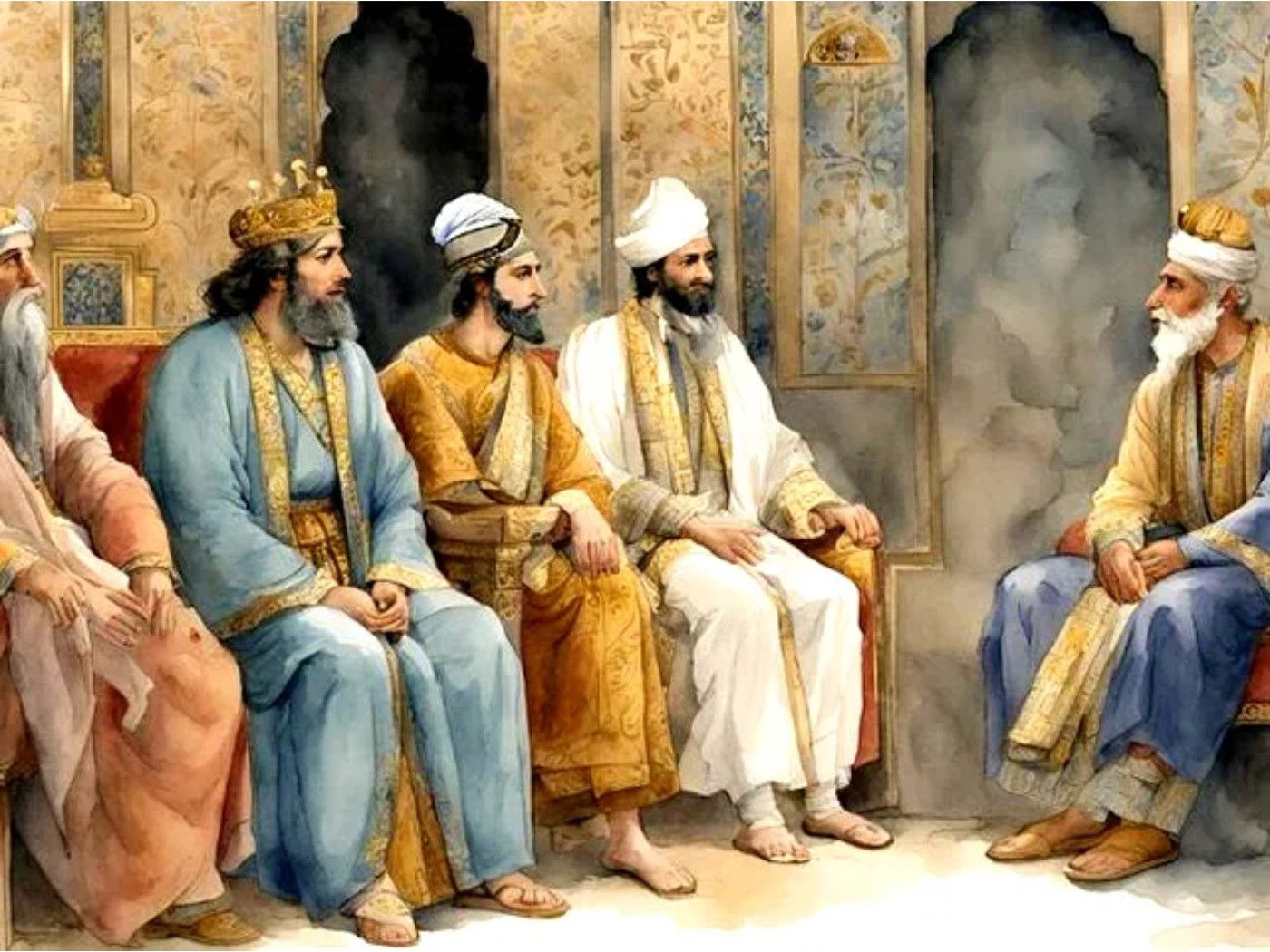Rehoboam was the son of Solomon and the grandson of David, who became the fourth king of Israel. Like his father, Rehoboam had many wives and dozens of children. He was the first king of Judah - the Southern Kingdom - and is considered a bad and negligent king due to his poor decisions and failure to seek God. The story of Rehoboam is recorded in 1 Kings 11:43, 12, 14, and in 2 Chronicles 10 and 11.
You will also find this article in Spanish: Quién fue Roboam
Surrounded by comfort and luxury, Rehoboam grew up in a magnificent palace in Jerusalem. He was the son of the legendary King Solomon and the grandson of the brave David, who was the most famous king of Israel. Rehoboam had everything he desired: fine clothes, delicious banquets, and many servants at his disposal. His mother was named Naamah, a foreign princess from the land of Ammon.
When Rehoboam was just one year old, his grandfather David passed away, and his father began to reign in Israel. Solomon reigned for 40 years, so after Solomon's death, when Rehoboam took the throne, he was approximately 41 years old.
Like his father, Rehoboam decided to take many wives. He had 18 wives and 60 concubines, and with them, he fathered 28 sons and 60 daughters. The two most important wives were Maalath, daughter of Jerimoth, and Maacah, daughter of Absalom, both granddaughters of David.
Rehoboam ascended to the throne as the new monarch of Israel, inheriting a stable and wealthy kingdom, thanks to the wise administration of his predecessors. With grand palaces, a powerful army, and prominent advisors, he enjoyed the benefits of an enviable legacy. However, despite being surrounded by such prosperity, he lacked the wisdom of God to make prudent decisions.

As soon as he came to power, the people asked Rehoboam to lighten the heavy tax burden imposed by his father. Rehoboam consulted the wise elders, who advised him to act with moderation and heed the people's just request. However, Rehoboam followed the counsel of the young advisors, choosing to oppose them. He decided to be harsh and unyielding, which led to serious consequences.
Rehoboam's immature decision resulted in the division of the kingdom of Israel. The people, feeling wronged by their young king, revolted. The northern tribes separated and formed their own kingdom, leaving Rehoboam with only a portion of the vast land that his grandfather and father had governed.
After 17 years of a troubled reign, Rehoboam died at the age of 58, and his son Abijah succeeded him on the throne. Despite some significant achievements, Rehoboam is generally viewed as a weak and reckless king who acted poorly and failed to seek God as his grandfather David had.
The Family of Rehoboam (Wives and Children)
Rehoboam was the grandson of King David and the son of the wise King Solomon and an Ammonite woman named Naamah. He married 18 women, two of whom, Maalate and Maacah, were related to him as they were also granddaughters of David. Among all his wives, Rehoboam loved Maacah the most, as she was the daughter of Absalom. In addition to these women, Rehoboam had 60 concubines (non-official wives) and fathered many children with them.
Overall, Rehoboam had 28 sons and 60 daughters. With Maalate, he had the sons Jeush, Shemariah, and Zaanan. With Maacah, he had Abijah, Atai, Ziza, and Shelomith. Rehoboam desired that Abijah, his firstborn with his beloved, would be his successor on the throne. Therefore, he appointed Abijah as prince over his brothers. Wisely, Rehoboam distributed all the other sons among fortified cities, thus establishing peace among his children.
The Reign of Rehoboam
Rehoboam's reign began with a significant challenge. The leaders of the people approached him with a humble request: "Please, reduce the taxes that your father imposed on us. They are too heavy for us to bear." The elders, wise men who were well acquainted with Israeli traditions, advised Rehoboam to be kind and considerate to his people, to listen to their needs, and to be a just king.
However, Rehoboam ignored the counsel of these wise men and consulted young advisors, who suggested a harsh response. He preferred to listen to his youthful friends, whose words sounded sweeter to his ears. Consequently, Rehoboam chose a path of rigidity and harshness.
The consequences of Rehoboam's immature and arrogant decision were severe and immediate. Ten tribes, which comprised the northern portion of Israel, separated from Rehoboam and formed the Kingdom of Israel (or Northern Kingdom) under the leadership of a new king, Jeroboam. Only the tribes of Judah and Benjamin remained loyal to Rehoboam, forming the Southern Kingdom, with Jerusalem as its capital.
Rehoboam even mustered his army in Jerusalem to wage war against the Northern Kingdom, but God forbade him from attempting to reclaim the ten tribes that had become independent under Jeroboam.
Rehoboam's rule was marked by conflicts with Jeroboam and also with Shishak, the king of Egypt, because Rehoboam had forsaken the path of God. The Southern Kingdom faced various internal issues during his reign, but Rehoboam ruled for 17 years over the Kingdom of Judah.
The Sin of Rehoboam
Considering the biblical texts, Rehoboam committed two significant sins:
-
Arrogance and Greed - Rehoboam's first sin was his pride and insensitivity in handling the people's request to lighten the tax burden. Instead of heeding the advice of wise and experienced elders, he chose to follow the counsel of young friends. They encouraged him to be harsh and stern with the people. This decision revealed his hardness of heart, lack of empathy, and disregard for the needs of his people, resulting in the revolt of the ten northern tribes (2 Chronicles 10).
-
Infidelity and Disobedience to God - For the first three years of his reign, Rehoboam followed the Lord (2 Chronicles 11:17). However, he was inconsistent in his faith and commitment to God's Word. He and the people turned away from the Lord, leading to God withdrawing His protection. Jerusalem was invaded by the Egyptian king Shishak, who plundered all the treasures of the king and the Temple in Jerusalem.
Lessons from Rehoboam's Life
The story of Rehoboam teaches us a hard lesson about the importance of seeking God, His wisdom, and having a genuine commitment to Him. By failing to listen to the wisdom of the elders and neglecting God's commandments, Rehoboam distanced himself from the Lord, resulting in numerous consequences, including the division of the Kingdom and material losses. Here are other lessons we can draw from Rehoboam's story:
-
The Importance of Obeying God - True wisdom and prosperity come when we follow God's ways and obey His commandments.
-
Wisdom in Decision-Making - Seeking wise counsel from trustworthy and more experienced individuals makes all the difference before making important decisions in our lives.
-
Consequences of Disobedience - Our choices have consequences; thus, we must remain faithful to God to experience His protection and blessings in our lives.
-
Serving with Humility and Compassion - It is essential to be sensitive to others and serve with kindness and empathy, especially when occupying positions of leadership.
Death and Succession of Rehoboam
Rehoboam died at the age of 58, and his son Abijah ascended to the throne of Judah. His story marks the end of a tumultuous period in the history of Israel and Judah. Despite his mistakes and conflicts, Rehoboam’s legacy serves as a warning about the consequences of disobedience and the importance of maturity and humility in leadership alongside God.
You Can Read the Full Chapters that Mention Rehoboam's Story:
- 2 Chronicles, Chapter 10
- 2 Chronicles, Chapter 11
- 1 Kings, Chapter 12
- 1 Kings, Chapter 14
You May Also Be Interested In: 18 Beautiful Bible Stories to Read and Reflect On

